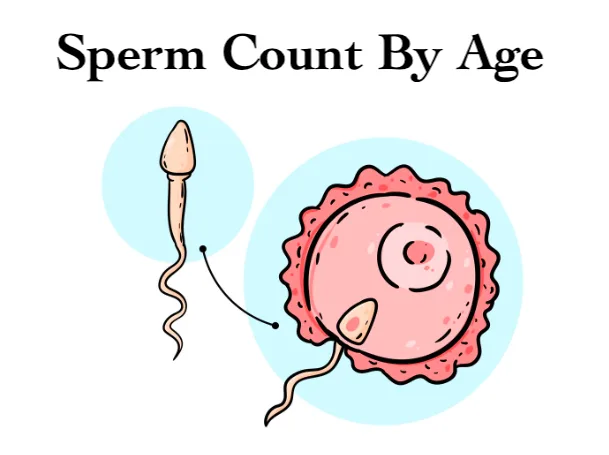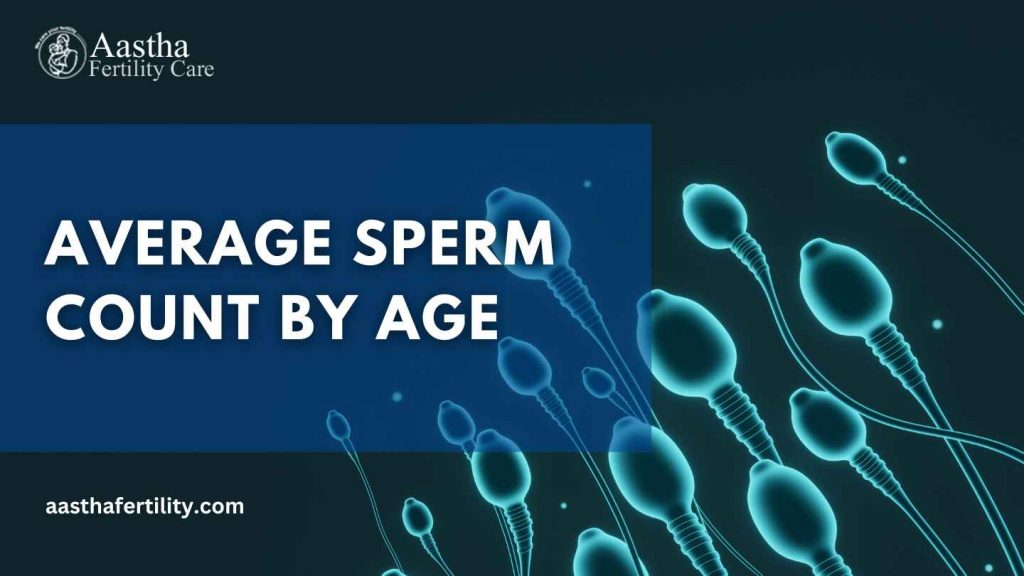Age is a critical factor in fertility, both for men and women. As women age, the availability of eggs in their ovaries decreases, making it increasingly challenging to conceive. For men, the situation is a bit different. While it is possible to father children later, it can also become more complex.
A healthy sperm count is crucial for male fertility and the ability to conceive. Several factors can affect sperm count, including age, lifestyle, medical conditions, and environmental factors. As men age, their sperm count may decrease due to changes in hormone levels and other health factors.
Lifestyle factors such as diet, exercise, tobacco, or alcohol use can impact sperm count. Medical conditions such as hormonal imbalances, testicular conditions, sexually transmitted infections, and cancer treatments can also play a role.
In this blog post, we will discuss the average sperm count by age and explore the various factors that can impact sperm count throughout a man’s life. If you are experiencing infertility issues, seeking medical help from Dr Namita(MBBS, MS – Obstetrics & Gynaecology) of Aastha Fertility Clinic can be beneficial.
Check out our guide on low sperm motility and minimum sperm count required for IVF for detailed facts.

Male Biological Clock: The Truth About Age and Fertility
Contrary to popular belief, men also face a biological clock when it comes to fertility. While men can technically father children throughout their lives, research consistently shows that male fertility begins to decline significantly after age 35, with more pronounced effects after 40.
Key Facts About Male Age and Fertility:
- Sperm concentration decreases by 1-2% per year after age 35
- DNA fragmentation in sperm increases by 1.5% annually after age 40
- Time to conception increases significantly for couples where the male partner is over 40
- Risk of pregnancy complications rises with paternal age
Complete Male Fertility Age Chart
Comprehensive Male Fertility Parameters by Age
| Age Group | Sperm Concentration | Motility Rate | DNA Fragmentation | Time to Conception |
| 20-29 years | 60-200 million/mL | 40-60% | <15% | 3-6 months |
| 30-34 years | 50-180 million/mL | 35-55% | 15-20% | 4-8 months |
| 35-39 years | 40-160 million/mL | 30-50% | 20-25% | 6-12 months |
| 40-44 years | 30-120 million/mL | 25-45% | 25-30% | 8-18 months |
| 45-49 years | 20-100 million/mL | 20-40% | 30-35% | 12-24 months |
| 50+ years | 10-80 million/mL | 15-35% | 35%+ | 18+ months |
Note: Normal sperm concentration according to WHO guidelines is ≥15 million/mL
Average Sperm Count By Age
As men age, their sperm count can decrease due to various factors, including changes in hormone levels, health conditions like diabetes, hypertension, and obesity, and a decrease in testicular efficiency. Lifestyle factors such as smoking, alcohol consumption, and poor diet can also contribute to the decline. These factors collectively can negatively impact sperm count and make it more challenging for men to conceive as they age.
Life Changing Experiences with Aastha Fertility - From Doubt to Success
Here’s a complete overview of Average Sperm Count By Age-
Sperm Count in Newborns And Infants
It is biological that sperm production only begins at puberty in males. Hence, newborns and infants do not possess any sperm count. However, during fetal development, male fetuses start generating primitive sperm cells known as spermatogonia. These immature cells will later develop into fully mature sperm cells during puberty.
It is crucial to understand that no scientific evidence supports the idea that the environment in which an infant is raised affects their future sperm count or fertility. Lifestyle choices and health conditions that can potentially affect sperm count only come into play later in life, during puberty and adulthood.
Sperm Count in Adolescents
During adolescence, males typically develop a sperm count as they enter puberty. The average sperm count in adolescent males is around 60-200 million/mL, but this number can vary significantly among individuals. It may take a few years for the sperm count to stabilize and reach a consistent level.
It is essential for adolescents to adopt healthy lifestyle habits, such as maintaining a nutritious diet and exercising regularly, as these factors can impact sperm count. Conversely, substance use, such as tobacco and alcohol, can harm sperm count. Medical conditions such as testicular infections or injuries can also affect sperm count during adolescence, and seeking medical attention is recommended if any concerning symptoms arise.
Sperm Count in Young Adults (20s-30s)
In young adulthood, typically between the 20s to 30s, males tend to have the highest sperm count and fertility. On average, a healthy young adult male may have between 15 million and 200 million sperm per milli litre of semen, although this can vary widely among individuals.
However, certain lifestyle factors, such as smoking, alcohol consumption, and drug use, can adversely affect sperm count and overall reproductive health. Maintaining a healthy lifestyle with regular exercise, a balanced diet, and avoiding harmful substances can help optimise sperm count and increase the chances of successful conception.
Addressing any medical conditions, such as sexually transmitted infections or hormonal imbalances, is also essential. Regular check-ups with a healthcare provider can help detect and address any potential issues.
Sperm Count in Middle-Aged Men (40s-50s)
As men reach middle age, usually between their 40s and 50s, their sperm count may decrease, although some may still have high sperm counts. A healthy middle-aged man may have between 10 million and 80 million sperm per milliliter of semen. However, lifestyle factors such as smoking, alcohol consumption, and poor diet can exacerbate this decline.
Medical conditions such as hormonal imbalances, testicular conditions, and certain health issues can also affect sperm count in middle-aged men. It is worth noting that conditions like Azoospermia (no sperm count) and oligospermia (low sperm count) can also occur in middle-aged men, and seeking medical attention for proper diagnosis and treatment is crucial.
Various symptoms of low sperm count will help diagnose the issue.
Sperm Count in Older Men (60s And Above)
As men age further, typically in their 60s and above, their sperm count and fertility may decrease even more. An older man may have between 1 million and 10 million sperm per milliliter of semen.
This decline in sperm count can be due to several factors, including changes in hormone levels, medical conditions such as diabetes or prostate issues, and lifestyle factors such as smoking and poor diet.
Additionally, age-related changes to the testicles can also impact sperm production. It is crucial to note that older men may be at a higher risk of genetic abnormalities in their sperm, which can increase the risk of developmental issues in offspring.
Therefore, seeking medical attention for any reproductive health concerns and adopting healthy lifestyle habits, including consuming food that increases sperm count, are crucial for optimal reproductive outcomes in older men.
Conclusion
A healthy sperm count is essential for successful conception; lifestyle habits can impact it during adolescence and young adulthood. Medical conditions and age-related changes can affect sperm count at any stage of life, so seeking medical attention is crucial.
At Aastha Fertility, everyone deserves a chance at a fulfilling reproductive future. We are committed to helping men overcome infertility and achieve their dreams of starting a family.
Our team of experienced specialists offers various diagnostic and fertility treatment options to address low sperm count and other male infertility issues. With our customized treatment plans and compassionate care, we have helped countless individuals achieve successful conception. Contact us today for a consultation and take the first step towards a brighter future.
Frequently Asked Questions
1. What is an average sperm count?
An average sperm count is between 15 million and 200 million sperm per millilitre of semen.
2. How does sperm count vary with age?
Sperm count tends to be highest during young adulthood, decreases in middle age, and can decline even further in older age.
3. Can lifestyle factors affect sperm count?
Smoking, alcohol consumption, poor diet, and lack of exercise can negatively impact sperm count.
4. Can medical conditions affect sperm count?
Medical conditions such as hormonal imbalances, infections, and prostate issues can impact sperm count.
5. Can low sperm count lead to infertility?
Low sperm count can factor into male infertility and decrease the chances of successful conception.
6. How is sperm count measured?
Sperm count is typically measured through a semen analysis, which involves collecting and examining a semen sample.
7. Can low sperm count be treated?
Low sperm count can be treated with various lifestyle changes, medications, and assisted reproductive techniques.
8. At what age does male fertility start declining?
Male fertility begins to gradually decline around age 35, with more significant impacts after age 40. Sperm concentration decreases by 1-2% per year, and DNA fragmentation increases by 1.5% annually after age 40.
9. Is there really a male biological clock?
Yes, research confirms that men have a biological clock. While less pronounced than women’s, male fertility decline affects sperm quality, conception rates, and offspring health risks as paternal age increases.
10. What are the risks of older fathers?
Advanced paternal age increases risks of autism, schizophrenia, childhood cancers, genetic mutations, and pregnancy complications. Risk increases progressively after age 35.







Leave a comment